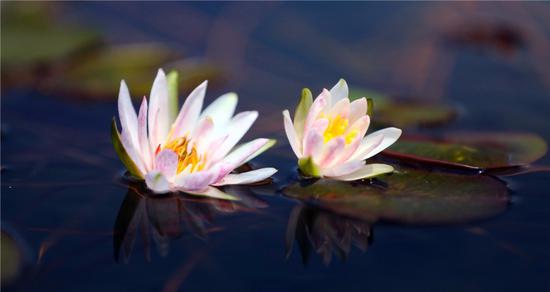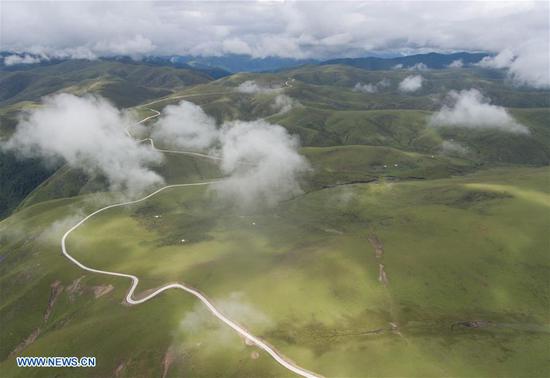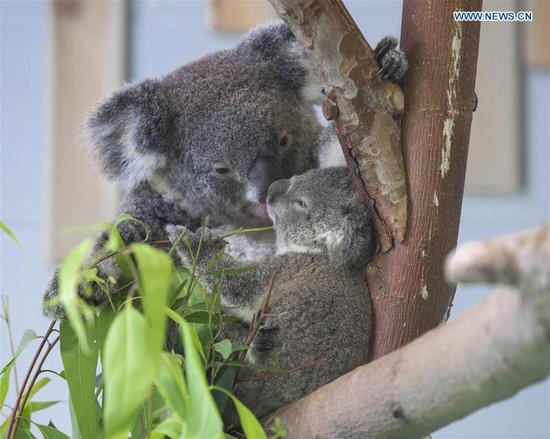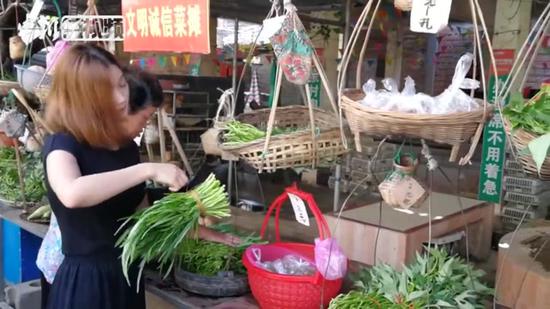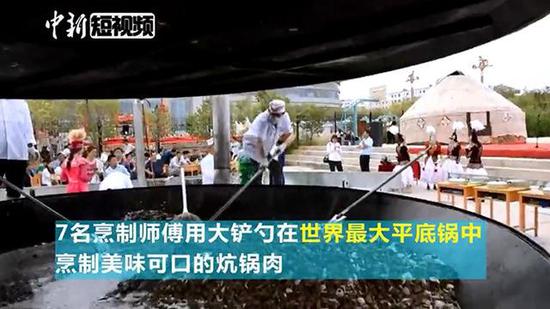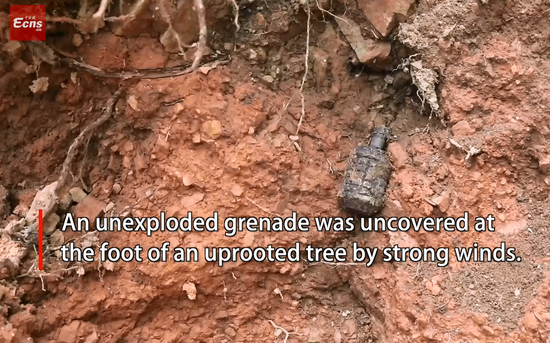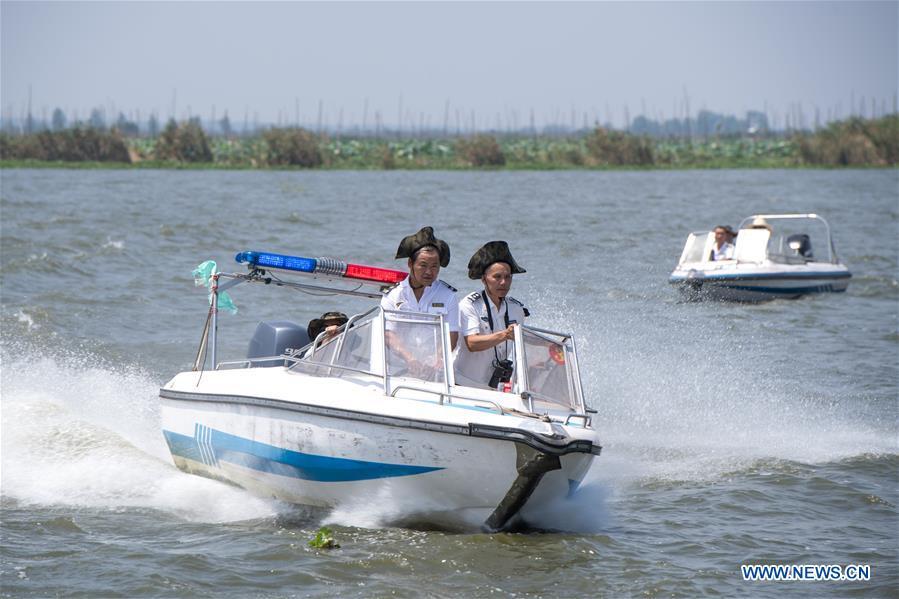
Staff members of the Xiaogang lake-patroller station patrol the Honghu Lake in Honghu City, central China's Hubei Province, Aug. 15, 2018. Honghu Lake, Hubei Province's biggest lake, is "a place better than paradise" with abundant fish, rice, lotus and ducks, says a popular Chinese folk song. This was true until overfishing ruined the 41,000-hectare wetland. To revive Honghu, local government has taken a series of protective measures, such as getting rid of all the fences and nets used to trap fish, monitoring water quality and using treatments that target specific problems, and relocating fishermen living around the lake. Now, after continuous efforts, the lake is coming back to life. Water quality has largely been rehabilitated, and the number of wild birds living here has risen from 2,000 to more than 100,000. A total of 12 patrollers work at the Xiaogang lake-patroller station, one of the three stations in the Honghu Lake to protect the water, plants and wild birds. They work in rotation in a team of five members guarding a water area of 17,000 hectares around the clock. Living and working on two boats, they struggle the harsh living condition to protect the ecological environment of the Honghu Lake. (Xinhua/Xiong Qi)
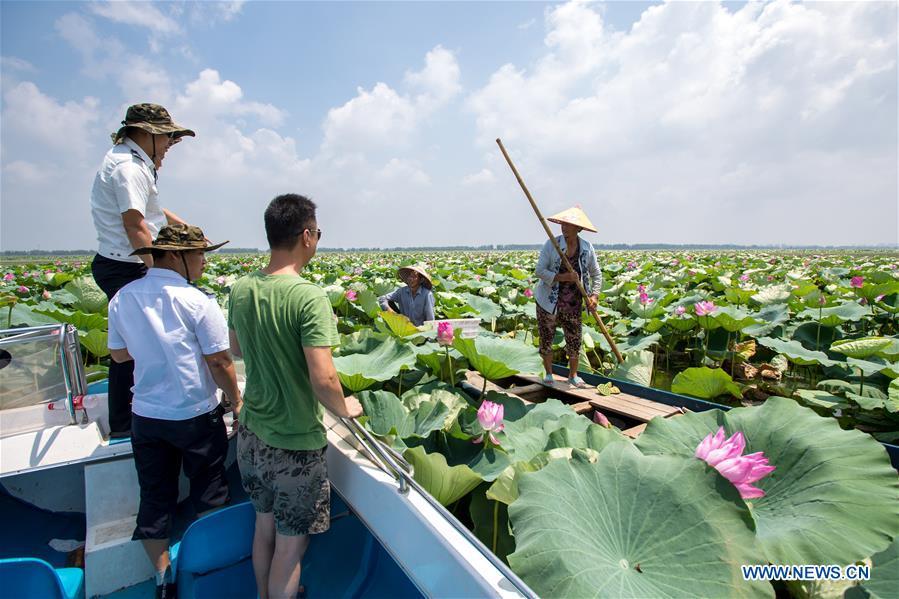
Staff members of the Xiaogang lake-patroller station patrol the Honghu Lake in Honghu City, central China's Hubei Province, Aug. 15, 2018. Honghu Lake, Hubei Province's biggest lake, is "a place better than paradise" with abundant fish, rice, lotus and ducks, says a popular Chinese folk song. This was true until overfishing ruined the 41,000-hectare wetland. To revive Honghu, local government has taken a series of protective measures, such as getting rid of all the fences and nets used to trap fish, monitoring water quality and using treatments that target specific problems, and relocating fishermen living around the lake. Now, after continuous efforts, the lake is coming back to life. Water quality has largely been rehabilitated, and the number of wild birds living here has risen from 2,000 to more than 100,000. A total of 12 patrollers work at the Xiaogang lake-patroller station, one of the three stations in the Honghu Lake to protect the water, plants and wild birds. They work in rotation in a team of five members guarding a water area of 17,000 hectares around the clock. Living and working on two boats, they struggle the harsh living condition to protect the ecological environment of the Honghu Lake. (Xinhua/Xiong Qi)
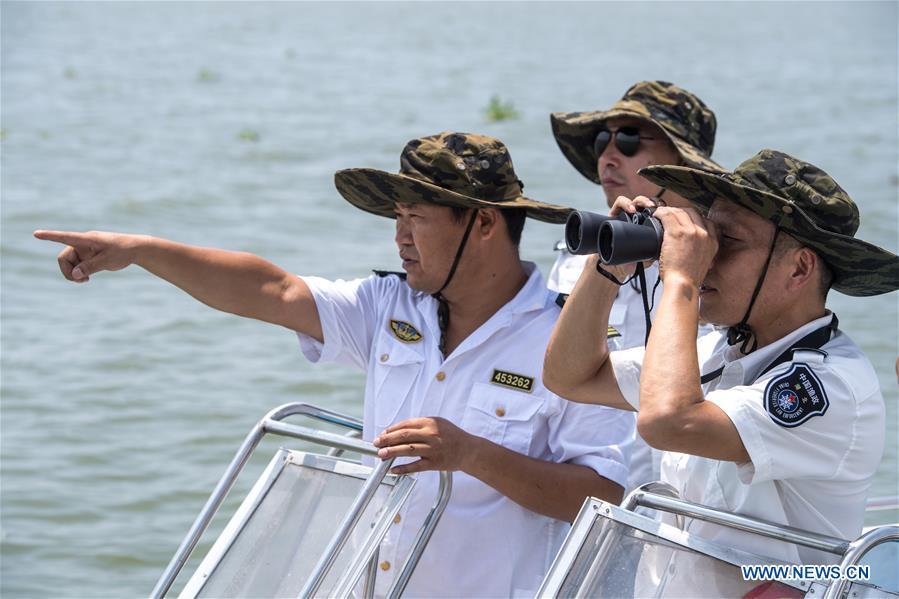
Staff members of the Xiaogang lake-patroller station observe the Honghu Lake in Honghu City, central China's Hubei Province, Aug. 15, 2018. Honghu Lake, Hubei Province's biggest lake, is "a place better than paradise" with abundant fish, rice, lotus and ducks, says a popular Chinese folk song. This was true until overfishing ruined the 41,000-hectare wetland. To revive Honghu, local government has taken a series of protective measures, such as getting rid of all the fences and nets used to trap fish, monitoring water quality and using treatments that target specific problems, and relocating fishermen living around the lake. Now, after continuous efforts, the lake is coming back to life. Water quality has largely been rehabilitated, and the number of wild birds living here has risen from 2,000 to more than 100,000. A total of 12 patrollers work at the Xiaogang lake-patroller station, one of the three stations in the Honghu Lake to protect the water, plants and wild birds. They work in rotation in a team of five members guarding a water area of 17,000 hectares around the clock. Living and working on two boats, they struggle the harsh living condition to protect the ecological environment of the Honghu Lake. (Xinhua/Xiong Qi)
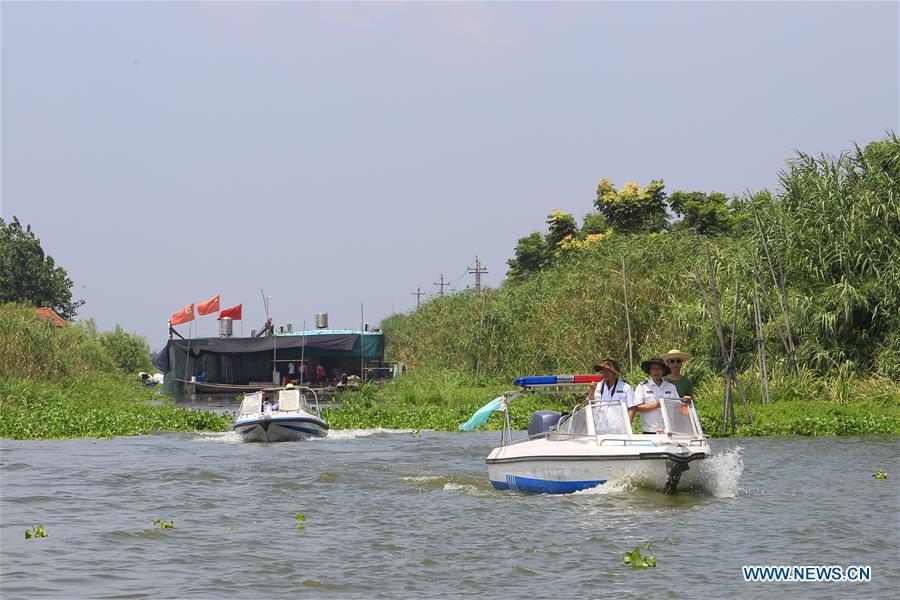
Staff members of the Xiaogang lake-patroller station patrol the Honghu Lake in Honghu City, central China's Hubei Province, Aug. 15, 2018. Honghu Lake, Hubei Province's biggest lake, is "a place better than paradise" with abundant fish, rice, lotus and ducks, says a popular Chinese folk song. This was true until overfishing ruined the 41,000-hectare wetland. To revive Honghu, local government has taken a series of protective measures, such as getting rid of all the fences and nets used to trap fish, monitoring water quality and using treatments that target specific problems, and relocating fishermen living around the lake. Now, after continuous efforts, the lake is coming back to life. Water quality has largely been rehabilitated, and the number of wild birds living here has risen from 2,000 to more than 100,000. A total of 12 patrollers work at the Xiaogang lake-patroller station, one of the three stations in the Honghu Lake to protect the water, plants and wild birds. They work in rotation in a team of five members guarding a water area of 17,000 hectares around the clock. Living and working on two boats, they struggle the harsh living condition to protect the ecological environment of the Honghu Lake. (Xinhua/Sui Xiankai)
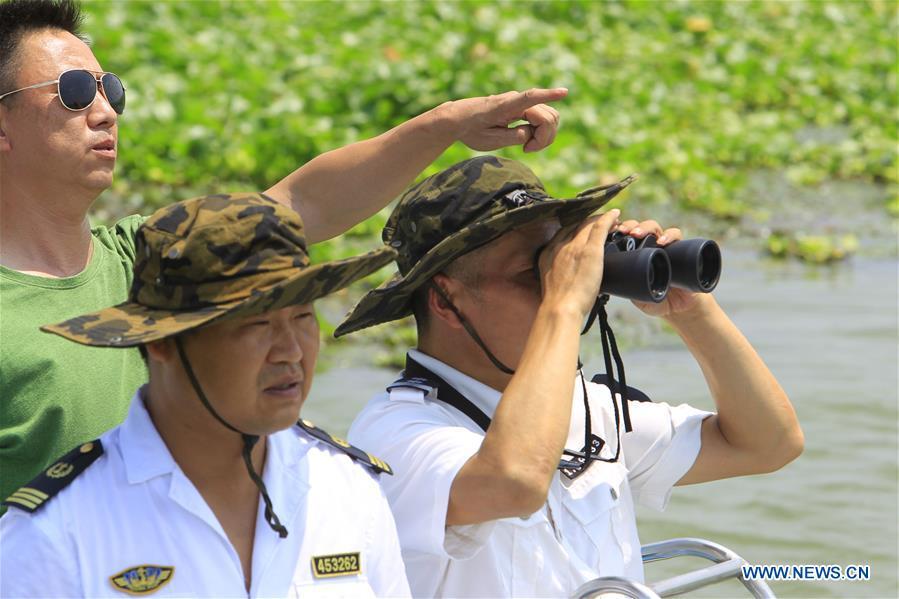
Staff members of the Xiaogang lake-patroller station observe the Honghu Lake in Honghu City, central China's Hubei Province, Aug. 15, 2018. Honghu Lake, Hubei Province's biggest lake, is "a place better than paradise" with abundant fish, rice, lotus and ducks, says a popular Chinese folk song. This was true until overfishing ruined the 41,000-hectare wetland. To revive Honghu, local government has taken a series of protective measures, such as getting rid of all the fences and nets used to trap fish, monitoring water quality and using treatments that target specific problems, and relocating fishermen living around the lake. Now, after continuous efforts, the lake is coming back to life. Water quality has largely been rehabilitated, and the number of wild birds living here has risen from 2,000 to more than 100,000. A total of 12 patrollers work at the Xiaogang lake-patroller station, one of the three stations in the Honghu Lake to protect the water, plants and wild birds. They work in rotation in a team of five members guarding a water area of 17,000 hectares around the clock. Living and working on two boats, they struggle the harsh living condition to protect the ecological environment of the Honghu Lake. (Xinhua/Sui Xiankai)
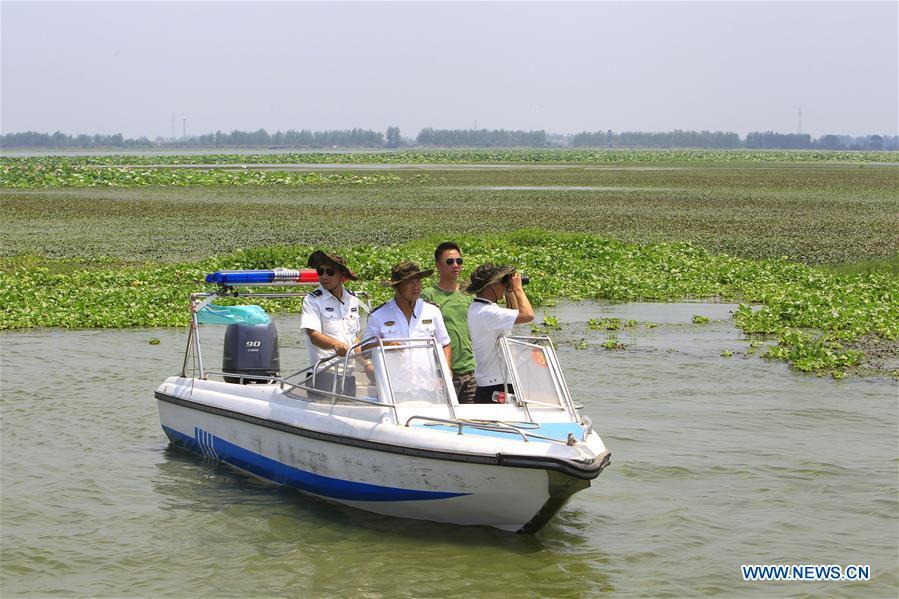
Staff members of the Xiaogang lake-patroller station patrol the Honghu Lake in Honghu City, central China's Hubei Province, Aug. 15, 2018. Honghu Lake, Hubei Province's biggest lake, is "a place better than paradise" with abundant fish, rice, lotus and ducks, says a popular Chinese folk song. This was true until overfishing ruined the 41,000-hectare wetland. To revive Honghu, local government has taken a series of protective measures, such as getting rid of all the fences and nets used to trap fish, monitoring water quality and using treatments that target specific problems, and relocating fishermen living around the lake. Now, after continuous efforts, the lake is coming back to life. Water quality has largely been rehabilitated, and the number of wild birds living here has risen from 2,000 to more than 100,000. A total of 12 patrollers work at the Xiaogang lake-patroller station, one of the three stations in the Honghu Lake to protect the water, plants and wild birds. They work in rotation in a team of five members guarding a water area of 17,000 hectares around the clock. Living and working on two boats, they struggle the harsh living condition to protect the ecological environment of the Honghu Lake. (Xinhua/Sui Xiankai)
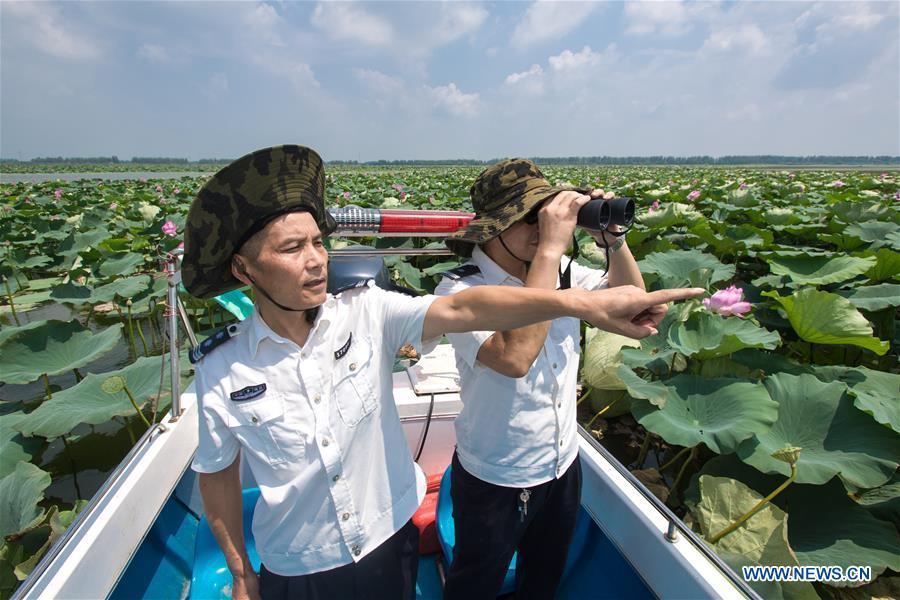
Staff members of the Xiaogang lake-patroller station observe the Honghu Lake in Honghu City, central China's Hubei Province, Aug. 15, 2018. Honghu Lake, Hubei Province's biggest lake, is "a place better than paradise" with abundant fish, rice, lotus and ducks, says a popular Chinese folk song. This was true until overfishing ruined the 41,000-hectare wetland. To revive Honghu, local government has taken a series of protective measures, such as getting rid of all the fences and nets used to trap fish, monitoring water quality and using treatments that target specific problems, and relocating fishermen living around the lake. Now, after continuous efforts, the lake is coming back to life. Water quality has largely been rehabilitated, and the number of wild birds living here has risen from 2,000 to more than 100,000. A total of 12 patrollers work at the Xiaogang lake-patroller station, one of the three stations in the Honghu Lake to protect the water, plants and wild birds. They work in rotation in a team of five members guarding a water area of 17,000 hectares around the clock. Living and working on two boats, they struggle the harsh living condition to protect the ecological environment of the Honghu Lake. (Xinhua/Wang Haijing)
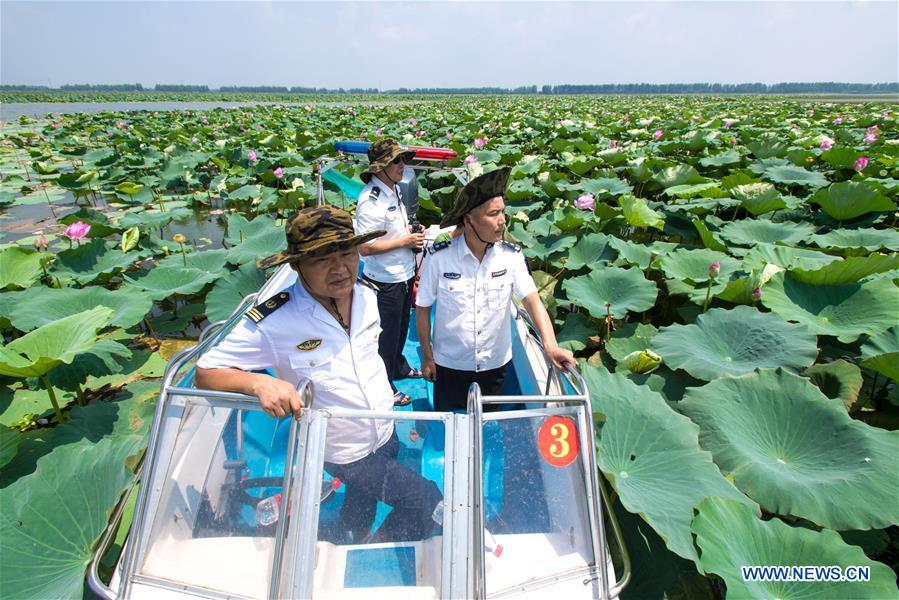
Staff members of the Xiaogang lake-patroller station patrol the Honghu Lake in Honghu City, central China's Hubei Province, Aug. 15, 2018. Honghu Lake, Hubei Province's biggest lake, is "a place better than paradise" with abundant fish, rice, lotus and ducks, says a popular Chinese folk song. This was true until overfishing ruined the 41,000-hectare wetland. To revive Honghu, local government has taken a series of protective measures, such as getting rid of all the fences and nets used to trap fish, monitoring water quality and using treatments that target specific problems, and relocating fishermen living around the lake. Now, after continuous efforts, the lake is coming back to life. Water quality has largely been rehabilitated, and the number of wild birds living here has risen from 2,000 to more than 100,000. A total of 12 patrollers work at the Xiaogang lake-patroller station, one of the three stations in the Honghu Lake to protect the water, plants and wild birds. They work in rotation in a team of five members guarding a water area of 17,000 hectares around the clock. Living and working on two boats, they struggle the harsh living condition to protect the ecological environment of the Honghu Lake. (Xinhua/Wang Haijing)
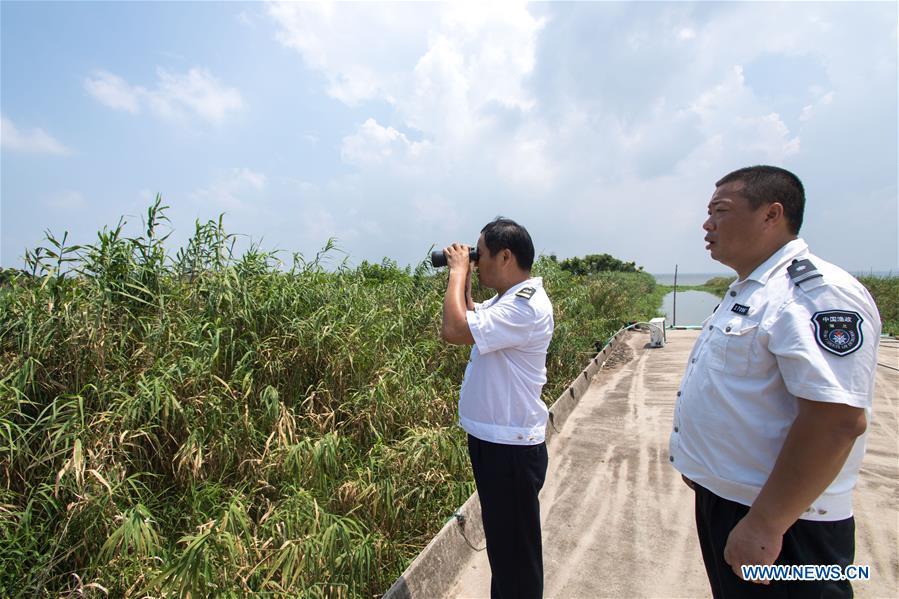
Staff members of the Xiaogang lake-patroller station observe the Honghu Lake in Honghu City, central China's Hubei Province, Aug. 15, 2018. Honghu Lake, Hubei Province's biggest lake, is "a place better than paradise" with abundant fish, rice, lotus and ducks, says a popular Chinese folk song. This was true until overfishing ruined the 41,000-hectare wetland. To revive Honghu, local government has taken a series of protective measures, such as getting rid of all the fences and nets used to trap fish, monitoring water quality and using treatments that target specific problems, and relocating fishermen living around the lake. Now, after continuous efforts, the lake is coming back to life. Water quality has largely been rehabilitated, and the number of wild birds living here has risen from 2,000 to more than 100,000. A total of 12 patrollers work at the Xiaogang lake-patroller station, one of the three stations in the Honghu Lake to protect the water, plants and wild birds. They work in rotation in a team of five members guarding a water area of 17,000 hectares around the clock. Living and working on two boats, they struggle the harsh living condition to protect the ecological environment of the Honghu Lake. (Xinhua/Xiong Qi)











